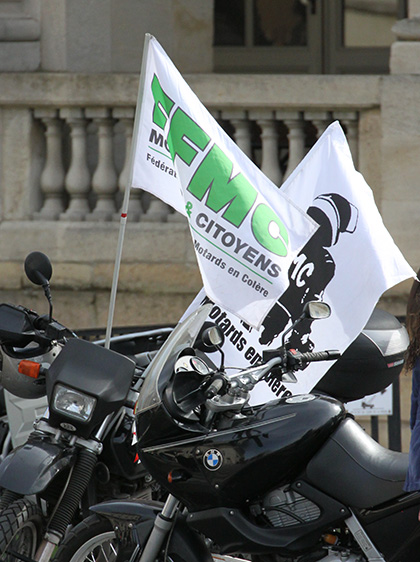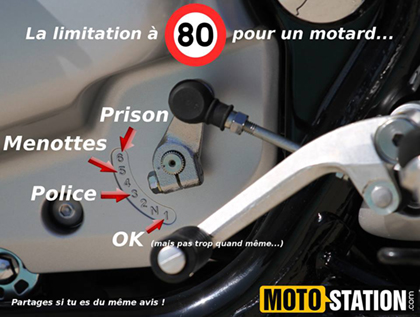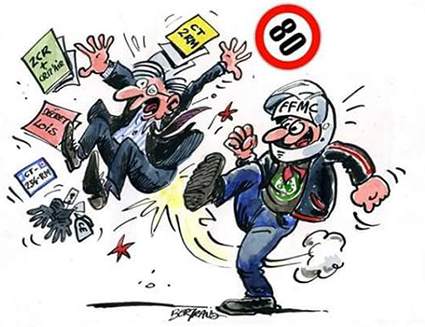 France – Over the next couple of weekends, motorcycle organisations are calling for riders to take to the streets in towns and cities to protest – mainly over the French government’s announcement to reduce the overall speed limit by 10kph, from 90kph to 80kph.
France – Over the next couple of weekends, motorcycle organisations are calling for riders to take to the streets in towns and cities to protest – mainly over the French government’s announcement to reduce the overall speed limit by 10kph, from 90kph to 80kph.
However, within this main protest, other ongoing issues such as the introduction of roadworthiness testing for motorcycles – congestion emission charging – road toll charging – revenue from “money making” speed cameras. The speed reduction has become a tipping point which seems to have arrived in time, so all are being thrown in for good measure.
Reduction on Speed
The speed limit reduction is scheduled to come into effect on the 1st July 2018, effects roads on routes without a central separator, calculated to be more than 400,000km of roads, basically the rural road network or two-way traffic.
The reduction is according to government estimates, expected to save 350-400 lives per year, these estimated figures will be monitored and if this goal is not reached it will be re-evaluated in July 2020. It is expected that revenue will increase from the speeding fines after the introduction. The French Prime Minister Édouard Philippe has promised that the entire surplus revenue will be allocated to a road accident fund. It appears that this may have come after a back lash from many in France that see this as an opportunity for government to continue its racketeering against them.
The Prime minister did not help his “cause” when to justify the reduction that to go from 90 km/h to 80 citizens would only lost 3 minutes for a journey of 40 km, seemingly forgetting his use of a private flight from Tokyo to Paris at the cost 350,000 euros to gain two hours on his schedule.
This reduced speed measure is one of several (eighteen apparently) government road safety measures, which were officially announced on the 9th January, all being claimed to help in the reduction of the number of collisions and their severity.
Against the Reduction
While as one can imagine “road safety” organisations favour the reduction, others do not.
The main protesting group against the 10kmp reduction for motorcycling appears to be the FFMC (Fédération Française des Motards en Colère – French Federation of Angry Bikers) along with FFM, the CODEVER, the CNPA Filière 2-roues and the CNPA Education Routière.
These organisations have decided to mobilise and remind the government of the 3 major priorities that would really save lives:
- Training / education
- Incentives for 2WD user equipment
- Road infrastructure
Also including against the reduction of the speed limit, the Fédération des Bikers de France, other organisations, Ligue de Défense des Conducteurs (League of Defence of Drivers), clubs and groups.
All these organisations seem to be singing from the same hymn sheet and in tune, why they are against the reduction while offering suggestions to really improve road safety.
In an article on its website – MOTO Station – looked at the environmental and safety “savings” and came to the conclusions that:
- riding at 80 km / h on a motorcycle reduces braking distance by only 3 meters: will this be significant enough to lower the number of deaths?
- riding at 80 km / h on a Yamaha MT-07 reduces the average consumption by 0.2 liters … but that is in 6th gear. However, the loss of driveability by engaging the engine in this gear is such at this speed that most will ride in 5th – a lower gear, so that the gain in consumption will be zero.
FFMC has had an on-line petition ongoing since December 2017 against the reduction asking common sense requests, for example:
- That the money collected by the radars serves more safety for the users: maintenance of the roads, doubling of the guardrails, etc …
- That highways, the least accidental network, we assume Toll roads, be made available to users and accessible for free.
FFMC Go On To Ask
 Asking government, to explain how it intends to solve all the questions of substance that such a measure would provoke:
Asking government, to explain how it intends to solve all the questions of substance that such a measure would provoke:
- Heavy goods vehicles are already limited to 80 km / h on the secondary network … will it be necessary to reduce their limitation to the risk of disrupting all road freight logistics (road time and geolocation of logistic platforms)?
- Will the VLs – Passenger Vehicle or Small Good Vehicle – have to run at the same speed as the PL – Medium/Large Goods – with all the inconvenience that this implies in terms of visibility and safety distances, possibility of overtaking, etc…
- What will be the cost of changing panels, materials and human resources? Who will pay these fees?
- What will the trade union organizations of the truck drivers say?
- How will the digital data (GPS, Coyote, Waze …) be adapted to this change of speed? In what conditions ?
Last but not least: how much money from automatic radars, and therefore from indirect taxes, does road safety count towards replenishing the state budget? And as always, to what extent will this money be used for road awareness and training for road users? That the money collected by the radars serves more safety for the users: maintenance of the roads, doubling of the guardrails, etc …
(The answer now given above by the Prime Minister that this will go into road safety)
One we would add ourselves is that on these roads 90kph when it rains then users should be reducing their speed to 80kph will this now mean that speed should be reduced to 70kph?
The implement a road safety policy that really saves lives on the road, starting with repairing and maintaining the road network and developing notoriously dangerous areas.
The League of Defence of Drivers has called for the implementation of, “a road safety policy that really saves lives on the road, starting with repairing and maintaining the road network and developing notoriously dangerous areas.” while calling the reduction, “unnecessarily repressive, counter-productive, retrograde and infantilising policy.”
French Politics
While only having a very rough understanding of how France is “governed” we understand that there is the French Parliament which consists of the Senate and the National Assembly, both of these legislatures can meet as the Congress of the French Parliament for certain procedures.
From our understanding these “road safety” measures are via the National Assembly however it looks like the Senate is not happy with the introduction of lowering the speed limit.
According to reports in the newspaper France Bleu the Senate is not convinced by the explanations of the Prime Minister regarding the reduction in speed, questioning a supposed two year study that prompted two senators to request the communication of the results of the scientific studies and experimentation on which the Government relied to decide the reduction, from 90 km / h to 80 km / h.
Cutting a bit of a long story short after a hearing requesting further explanations on the government plans a joint working group on road safety composed of three senators. A statement issued says, “” It is a question of gathering the elements of information necessary to evaluate, without a priori, the utility for the fight against the insecurity of road of a reduction to 80 km / h of the speed We are still waiting for the results and the scientific value of the studies and experimentation that we have requested by mail to the Prime Minister, starting on Thursday, January 11. If necessary, the commissions could seek the prerogatives (interpretation – power to set up of a commission of inquiry to obtain these documents. Road safety is an essential issue, which deserves more than announcement effects. “
Hervé Maurey – Sénateur de l’Eure (Normandie) in an interview in Le Figaro has said:
- We still do not know whether this restrictive measure is proportionate to the expected effects such as the decline in mortality.
- We feel that the work done before the announcement of this measure was botched. The press kit contains unreliable information. Those relating to the reduction of pollution refer us to the site of an individual whose data have not been updated since 2009. This is not serious and even less when it comes to imposing an infringing measure on freedoms.
- It penalizes the population of the rural world who, to circulate, is obliged to take his car and who uses these roads on which the speed will be reduced.
- We would like to know why the government has not turned to another solution: to impose 80 km / h when necessary. This is the case when the road is dangerous because of its state or configuration.
- If we are not convinced by this measure, we will let the government know. We will lobby him to consider our findings. We have some time for this because the 80 km / h must come into effect next July.
So, if you are planning to come or to France as one of tens of thousands of tourists – foreign drivers or riders – bringing your hard-earned converted pounds from “Blighty” and thinking of by passing France or heading elsewhere because of these restrictions then it’s worthwhile keeping a watching eye on the developments from user organisations and the hard asking political questions – its not a done deal yet!
List of demonstration Motomag.com
Some Of The “Sensible” Other Measures
 Any driver that is stopped and has their vehicle confiscated due to excess alcohol in the blood for the second time, will only be able to get their car back if they take a medical test, and if their car is then fitted with a breathalyser device that prevents it from starting if the driver has too much alcohol in their system.
Any driver that is stopped and has their vehicle confiscated due to excess alcohol in the blood for the second time, will only be able to get their car back if they take a medical test, and if their car is then fitted with a breathalyser device that prevents it from starting if the driver has too much alcohol in their system.
Anyone who is found to be driving while under the influence of narcotic drugs or who has more than 0.8 grams of alcohol in their blood will see their car “immediately” impounded for seven days.
However those who have had their licence removed for an alcohol offence, may be allowed to drive during the period of suspension on the condition of equipping his vehicle with an anti-start alcohol test.
Police will be allowed to confiscate driving licences “on the spot” if they see a driver using a phone and committing a driving offence while doing so, for example the non-use of the turn signal when turning.
Removal of parking spaces near protected passages to increase the visibility of pedestrians.


That’s the way to do it – citizen demonstrations and representation to legislators – as FFMC are invited to give evidence at a Senate working group – via MOTOMAG.com – Goggle Translate
80 km / h: the Senate raises the tone
9th February 2018
News from MOTOMAG.com/FFMC is that, “In a letter dated Thursday, February 9, addressed to Prime Minister Edouard Philippe, the Senate officially requested the suspension of “the establishment of the limitation to 80 km / h of the maximum speed allowed on certain roads in waiting conclusions of the working group.”
A Senate working group has been set up to, “Evaluate the “usefulness and effectiveness” of the measures announced by the government with regard to road safety, notably the reduction of the speed limit on departmental roads.”
So the proposed introduction of the 1st July 2018 is not set in stone just yet – the deal is not done
Original Source – MOTOMAG.com
Demonstration in Paris
Original Source – Full story & pictures MOTOMAG.COM
Saturday 3rd January 2018 – 4000 angry bikers parade in Paris against the 80km/h – Despite a continuous rain all day, nearly 4000 bikers and 200 motorists mobilized in the capital on Saturday, January 3, 2018 at the call of the FFMC Ile-de-France. They oppose the lowering of the maximum authorized speed of 90 to 80 km / h on the roads of the secondary network and demand real measures of road safety.
Behind the bikers, led by the FFMC PPC and other antennas FFMC Ile-de-France (77, 78, 91, 95), are also present the Federation of Bikers of France (FBF), 40 Million Motorists , the French Federation of Motorists Citizens, the Udelcim and Valve.
Alongside angry bikers, the 40 million motorists association was also present. “They are strong these bikers anyway, underlines with a big smile Pierre Chasseray, general delegate of 40 million motorists.
“Of course, the reason for the rally is to denounce the decline to 80 km / h on the roads” – explains Jean-Marc Belotti, coordinator of the FFMC PPC. “This is ridiculous, but what we are denouncing today is the management of road safety as a whole. We thought that with a new government made up of young people from civil society, the way to address road safety issues would evolve. Well no, we realize that they are always the same recipes: repression, repression, always more repression. Nothing is done for road safety education, from early childhood and throughout life, while every year, more than 600 young people between the ages of 18 and 25 die on the roads. Nothing is being done either in terms of dangerous road infrastructures, which nevertheless cause more than 800 deaths per year. When will a government put real road safety in place for road users and not against them?”
The information keeps giving – this time from an article on-line in Auto Infos
4 million signatures collected in the 10 national petitions opposing it
(a) Reduce fuel consumption by 30% … which is very exaggerated compared to the expected 10%
(b) Reducing braking distances by 24 meters (57 meters at 80 km / h versus 81 meters at 90 km / h). Still very exaggerated because the real difference is 10 meters (46 to 80 km / h against 56 to 90 km / h) provided not to relax its concentration at 80km / h, which would produce a zero gain (see test performed by Auto-Moto on Sunday 16/01)
(c) Lower the average speed observed, since the latter would have increased by 4 km / h since 2012. Again, a counter-truth, since the speed has remained stable on two-way lanes …
(d) Save 300 to 400 lives a year. This is obviously desirable because each tragedy of the road is a tragedy in itself. However, this forecast was established on the basis of tests carried out for 2 years on 80 km of road, once they have been completely renovated (new asphalt, markings redone, widened tracks, roundabout created and radar double direction … ). When we know, thanks to Road Safety’s own statistics, that the ratio of the number of people killed on the road in 2016 is 5.8 deaths per billion kilometers traveled, compared to 5.76 in 2013, we measure the number of people killed. numbers to always make us feel guilty … and therefore tax us!
To answer the question we asked – “One we would add ourselves is that on these roads 90kph when it rains then users should be reducing their speed to 80kph will this now mean that speed should be reduced to 70kph?”
The France Routes website article states that an answer of an expert says, “Within the National Road Safety Council (CNSR), a body of observers, road traffic specialists, representatives of victims’ associations, driving behavior researchers and insurance professionals, the question whether the maximum speed limit for heavy goods vehicles and light commercial vehicles should be lowered, for motorists in rainy weather and for drivers with a probationary license. “No, the speed limit will not be reduced, neither for heavy goods vehicles nor during rainy weather,” explained one observer………….”
The article continues, “On roads classified as dangerous, this measure, which is supposed to improve road safety, promises to create risk situations that did not exist. Vehicles of different sizes will have to circulate at the same pace. It will become impossible for a motorcyclist or motorist to overtake a truck in order to increase his visibility. Public transport vehicles of more than 10 t will be able to travel faster than cars and motorcycles.”